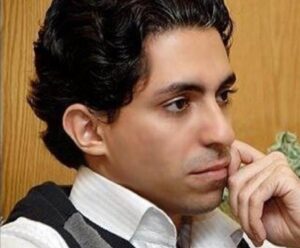


Raif Badawi is a Saudi Arabian writer, dissident and human rights activist.
In 2006 Badawi created a website called the Saudi Liberal Network, with the intention of encouraging free political and social debate in Saudi Arabia – one of the only such fora for free communication in the country. In his writings, Badawi advocated for principles of secular thought and liberalism in his writing.
Badawi was convicted in 2013 of “insulting Islam through electronic channels”. He was initially sentenced to seven years in prison and 600 lashes. The following year, his sentence was increased to 10 years and 1,000 lashes. He received 50 of those lashes in January 2015, while the remaining 950 were postponed due to a combination of his deteriorating health and international public outcry.
The authorities have consistently hidden information about his conditions in detention, and his contact with the outside world has been infrequent.
History of the case
2022
11 March
Multiple sources, including Badawi’s wife, confirm that Badawi has been released from prison following the expiry of his sentence. It remains unclear whether he will be able to leave the country to join his family in Canada, due to the 10-year travel ban attached to his sentence. Badawi has no judicial means to challenge the travel ban, other than by a royal pardon.
2021
June
Raif Badawi’s sister, Samar Badawi, is released after serving a 3 year sentence for her activism.
March
According to Badawi’s international legal team, around this time Saudi authorities start investigating Badawi on charges of “inciting public opinion” and “damaging the reputation of the country abroad.” (Note: further information about the investigation is not readily available).
28 January
Members of the Canadian House of Commons unanimously vote to grant Badawi Canadian citizenship.
2020
August
Badawi is subject to an assassination attempt in prison. Badawi undertakes another hunger strike to protest the lack of protection afforded to him in prison. Badawi shares a cell with 15 prisoners, some of those have been convicted of terrorism offenses.
April
The Saudi Arabian government announces its decision to abolish the use of flogging as a punishment. The decision officially means that Badawi will not have to undergo the remaining 950 lashes as part of his sentence.
Badawi’s wife receives news that Badawi has been taken to hospital for treatment, but authorities refuse to confirm the news.
2019
September
Badawi begins another hunger strike over his mistreatment in prison, including the confiscation of his books and medicine by prison officials and the lack of medical care over pain in his kidneys.
2018
August
Badawi’s sister, Samar Badawi, also a human rights activist, is arrested. Samar Badawi’s activism focuses on challenging gender-based discrimination, including abolishing Saudi Arabia’s male guardianship’s system and advocating for women’s right to drive.
The Canadian foreign ministry calls for her release, and the Canada’s foreign minister tweets that “Canada stands together with the Badawi family in this difficult time, and we continue to strongly call for the release of both Raif and Samar Badawi.” The Saudi Arabian government responds to the tweet by deploying sanctions against Canada, including a freeze on all new bilateral trade and investment, a suspension of all flights to Canada, and an order for 16,000 Saudi students to leave Canada.
2017
June
Humanists International delivers a personal plea from Badawi’s wife, Ensaf Haider, at the 35th session of the UN Human Rights Council (HRC).
2016
June
Badawi goes on hunger strike because essential medication is being withheld from him. His hunger strike ends when he is eventually taken to hospital
2015
17 June
A civil society Global Day of Action takes place to mark three years since Badawi’s arrest.
8 June
Saudi Arabia’s Supreme Court upholds Badawi’s sentence of 10 years imprisonment.
9 January
Badawi is flogged 50 times in public before hundreds of spectators in front of Al Juffali Mosque in Jeddah after Friday prayers. Governments around the world, including
the USA, Canada, Germany, and Norway, among others, condemned the flogging.
2014
September
Badawi’s revised sentence is upheld by the Jeddah Court of Appeal.
6 July
Badawi’s lawyer and brother-in-law, Waleed Abu al-Khair, is sentenced to 15 years imprisonment for ‘terrorism’ charges relating to his human rights activism.
7 May
Badawi’s sentence is increased to ten years imprisonment, 1,000 lashes, a fine of 1 million Saudi Riyals (approx. US$ 266,616). Following his release, Badawi will be subject to a 10-year travel ban and a 10-year ban from participating in visual, electronic, and written media.
2013
29 July
A Criminal Court finds Badawi guilty and he is sentenced to seven years’ imprisonment and 600 lashes for “insulting Islam” through his website and through comments he made on television, under Saudi Arabia’s anti-cyber crime legislation.
During the trial the prosecution originally recommended charging Badawi with apostasy, a crime punishable by death, but this charge was dropped after Badawi stated that he was a Muslim recited the Islamic declaration of faith.
During the trial, Badawi does not have the opportunity to speak with his lawyer, and his lawyer is prevented from attending the hearing in order to plead his case.
His wife, Ensaf, in exile in Lebanon with Badawi’s children, receives phone calls from anonymous individuals threatening to kill Badawi.
17 June
Badawi is arrested and detained in Jeddah’s Buraiman prison.
May
Badawi organizes a “Day for Saudi Liberals” on 7 May, asking citizens to post their vision of a Saudi society online and encouraging open discussion about politics and religion. His lawyer later states that he believes Badawi became a target for the regime after the widespread success of the day.
2008
May
The prosecution service in Jeddah charges Raif Badawi with “setting up an electronic site that insults Islam,” and refers the case to court, asking for a five-year prison sentence and a 3 million riyal (approximately €600,000) fine. Badawi is interrogated by religious police and his house is searched, but the investigation against him is eventually dropped.
Background Information
Badawi was born in Khobar, in 1984. He attended school until the age of 13. Around that time, his father reported him for parental disobedience and he was sent to a teenage detention center for six months, where he faced harsh punishments and religious indoctrination.
Badawi’s writing is inspired by many freethinking Arab intellectuals with liberal views, such as Mohammed Saeed Tayeb. Celebrated internationally for his work, Badawi has been recognized with Reporters Without Borders’s Press Freedom Prize, with PEN’s Pinter Prize and One Humanity Award, with the Franco-German Journalism Prize, by the International Publishers Association. Extracts of Badawi’s writings can be read here.
Badawi married his wife, Ensaf, in 2002. Ensaf and their children live in Canada. Haidar continues to campaign for her husband’s release from Québec, where she maintains his official Twitter account.
Country background
Freedom of religion or belief is extremely oppressed in Saudi Arabia. Wahhabism – commonly described as an “ultra conservative” or “fundamentalist” branch of Sunni Islam – is functionally recognized as the state religion. The country’s laws are based on Sharia law.
Saudi laws amount to an amalgamation of Sharia, royal decrees, and fatwas issued by the Council of Senior Religious Scholars. In addition to the typical offenses of desecrating a Qur’an or insulting the Prophet Muhammad, a wide variety of crimes can be labeled as blasphemy.
Apostasy is criminalized and mandates a death penalty. The criminal accusation of “apostasy” is sometimes deployed against people (including writers, activists, artists, or lawyers) who show any serious sign of pushing at the outer boundaries of freedom of expression, or who are critical of the religious authorities, and whose views (rightly or wrongly) are termed “atheist” or as “insulting to religion”. These laws are actively utilized (see Highlighted cases, below).
Humanists International’s concerns and calls
Humanists International calls on Saudi Arabia to:
- lift the 10-year travel ban attached to Badawi’s sentence which is preventing him from joining his wife and children abroad.
- lift the ban attached to Badawi’s sentence which is preventing him from participating in visual, electronic, and written media, and from talking to NGOs.
- waive the fine of 1 million Saudi Riyals (approx. US$ 266,616) attached to Badawi’s sentence.
Humanists International has followed Badawi’s case since his arrest in 2012, and called his original sentence in July 2013 a “gratuitous” and “violent” act. In September 2013, Humanists International delivered a statement in Arabic at the UN Human Rights Council condemning the sentence against him. In 2017, Humanists International delivered a personal plea on behalf of his wife, Ensaf, calling on the Council to apply more pressure on Saudi Arabia to release Badawi in line with its human rights obligations.
